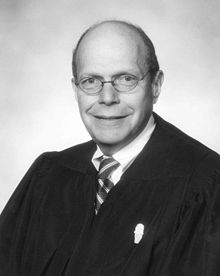By Rick Thompson June 27 A veteran judge originally appointed by Ronald Reagan has delivered a stunning sentence in a case involving thousands of marijuana plants grown by a farmer in Michigan.
In Lenawee County, 61 yr old Edward Schmieding enrolled in Michigan’s medical marijuana program (MMP) in 2010 to help him recover from throat cancer. He and his wife Linda began cultivating marijuana, and when the authorities arrested them they were in possession of over 8,000 medical marijuana plants.
The case went federal and was assigned to United States District Judge Bernard Friedman. On Tuesday of this week Friedman ruled that Edward would receive a penalty of one day in jail and 2 years probation; he gave Edward credit for a day already spent in custody and therefore the man will receive no jail time. Charges had already been dropped against his wife.
Judge Friedman was moved to give the extraordinarily light sentence to Schmeiding because of community and family outreach. Letters were written and submitted to the Court by Schmeiding’s attorney, Sanford Schulman. The court room was full of supporters, some of whom wept openly during the sentencing hearing.
“This is one that most screams out: This man deserves a break,” U.S. District Judge Bernard Friedman was quoted by the Associated Press as saying.
Neighbors, family and even an ex-wife of Schmeiding’s came to court to testify for leniency in sentencing. Tales of community service, a tough life in a house heated by firewood in the winter and generosity of spirit were enough for Friedman to ignore normal sentencing guidelines.
“It’s a bad thing that’s happened to you but you’ve lived a good life,” the judge reportedly said.
 Federal convict Jerry Duval and wife being interviewed by MLive after the Detroit press conference for Michigan ASA
Federal convict Jerry Duval and wife being interviewed by MLive after the Detroit press conference for Michigan ASA
Recognizing that Schmeiding was an upstanding citizen and that he was not at the center of a distribution ring like “Pablo Escobar”, Assistant US District Attorney C. Barrington Wilkins made no objection to the abnormal sentencing.
Friedman delivered his verdict from his Court in the Theodore Levin Federal Courthouse in Detroit, where just weeks ago a press conference was held to detail the federal convictions of 10 Michigan citizens on marijuana cultivation charges. Jerry Duval, a transplant recipient, was a principal speaker at the press conference and surrendered himself to federal authorities earlier this month to begin his sentence for growing far less than 8000 plants. An estimate by Americans for Safe Access predicts that the federal government will spend over $1.2 million to house and medically treat Duval during his period of incarceration.
Among the 10 Michigan medical marijuana program participants serving time in federal prisons are seven from Lansing, including Ryan Basore and Lance Forsberg. Basore was given the most strict penalty of the seven- 4 years in a federal corrections facility in West Virginia. In the case of the Lansing Seven, individual growing operations, each compliant with the Michigan medical marijuana laws, were aggregated together by federal prosecutors to create a plant count that was large enough to win a conviction. Together the Seven had plants numbering in the hundreds, not thousands.
It is this disparity in sentencing that creates distrust in the federal government’s ability to reasonably handle medical marijuana cases. Although Schmeiding certainly deserved leniency, so did Basore. So did Forsberg. So did his father, who was also convicted, and so did Jerry Duval’s son, convicted of the same crime as his father and already serving time in federal prison when the Michigan ASA group held their press conference/protest outside the Courthouse in Detroit.
Perhaps Friedman’s long history of service was partly responsible for his delivery of Schmeiding’s light sentence. Friedman was a Lieutenant in the military and served during Vietnam; he graduated from MSU’s Detroit College of Law, had a private practice in the city and was a felony trial lawyer for Wayne County. During his years of exposure to serious crime Friedman undoubtedly saw many people deserving of punishment, and likely saw those that were victims of the system as well. In 2008 the Federal Bar recognized Friedman’s extraordinary nature by naming their professional civility award after him.





